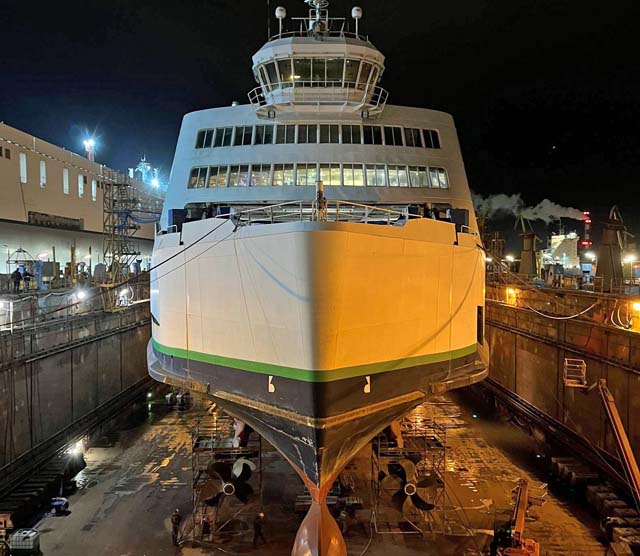Scandlines’ double-ended ferry ‘Prinsesse Benedikte’, the last of four hybrid ferries operating between Puttgarden (Germany) and Rødby (Denmark), has had four new thrusters installed, being more efficient and thus energy-saving than the previous push thrusters.
The € 13m investment in upgrading the Fehmarn ferries is now complete, and the company expects a significant reduction in its environmental impact. The propulsion system of each hybrid ferry consists of four thrusters – one at each corner of the ferry. The whole entity (thruster) can rotate around its vertical axis and thereby function as a rudder. The new thrusters – Azipull 120 FP – ensure a more homogeneous flow through the water, resulting in less noise and vibration. Less underwater noise and less vibration provide better conditions for marine life in the Fehmarnbelt, including harbour porpoises. In addition, the more homogeneous water flow ultimately reduces emissions, including CO2.
Together with the new thrusters, head boxes were installed which slightly change the ship hull around the thruster to further optimise the water flow to the propeller. A total of 16 thrusters were replaced on the four hybrid ferries operating on the Fehmarnbelt. The push-thruster units previously fitted were of the Contaz 35 type.
Michael Guldmann Petersen, COO Scandlines, said: “With the completed project, we have reduced CO2 emissions from the hybrid ferries by up to 15% and thus taken an important step towards zero emission ferries on the Puttgarden-Rødby route. We are very pleased that this can be combined with less impact on the marine environment in the Fehmarnbelt.”
The 16 new thrusters as well as the new thruster control system for the bridge of each vessel have been delivered by Kongsberg Maritime. In parallel with the replacement of the thrusters of the hybrid ferries, Scandlines’ simulator in Puttgarden has also been upgraded so that the crew has been optimally prepared for the new propulsion system.
Climate and environmental issues have long had top priority on Scandlines’ agenda. As early as 2013, the ferry company invested in hybrid ferries with battery banks, and in 2024 the first zero direct emission ferry will begin service on the Puttgarden-Rødby route. By 2030, the entire route is expected to be emission-free.



